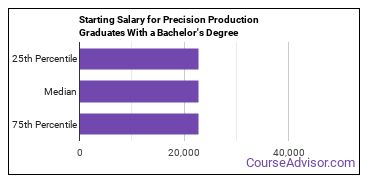Precision Production
Featured schools near , edit
Types of Degrees Precision Production Majors Are Getting
The following table lists how many precision production graduations there were in 2020-2021 for each degree level.
| Education Level | Number of Grads |
|---|---|
| Basic Certificate | 29,416 |
| Undergraduate Certificate | 18,580 |
| Associate Degree | 4,881 |
| Bachelor’s Degree | 28 |
| Master’s Degree | 8 |
What Precision Production Majors Need to Know
In an O*NET survey, precision production majors were asked to rate what knowledge areas, skills, and abilities were important in their occupations. These answers were weighted on a scale of 1 to 5 with 5 being the most important.
Knowledge Areas for Precision Production Majors
According to O*NET survey takers, a major in precision production should prepare you for careers in which you will need to be knowledgeable in the following areas:

- Mechanical - Knowledge of machines and tools, including their designs, uses, repair, and maintenance.
- Mathematics - Knowledge of arithmetic, algebra, geometry, calculus, statistics, and their applications.
- Production and Processing - Knowledge of raw materials, production processes, quality control, costs, and other techniques for maximizing the effective manufacture and distribution of goods.
- Design - Knowledge of design techniques, tools, and principles involved in production of precision technical plans, blueprints, drawings, and models.
- English Language - Knowledge of the structure and content of the English language including the meaning and spelling of words, rules of composition, and grammar.
Skills for Precision Production Majors
A major in precision production prepares you for careers in which the following skill-sets are crucial:

- Operation Monitoring - Watching gauges, dials, or other indicators to make sure a machine is working properly.
- Operation and Control - Controlling operations of equipment or systems.
- Monitoring - Monitoring/Assessing performance of yourself, other individuals, or organizations to make improvements or take corrective action.
- Critical Thinking - Using logic and reasoning to identify the strengths and weaknesses of alternative solutions, conclusions or approaches to problems.
- Quality Control Analysis - Conducting tests and inspections of products, services, or processes to evaluate quality or performance.
Abilities for Precision Production Majors
Precision Production majors often go into careers where the following abilities are vital:

- Near Vision - The ability to see details at close range (within a few feet of the observer).
- Arm-Hand Steadiness - The ability to keep your hand and arm steady while moving your arm or while holding your arm and hand in one position.
- Control Precision - The ability to quickly and repeatedly adjust the controls of a machine or a vehicle to exact positions.
- Manual Dexterity - The ability to quickly move your hand, your hand together with your arm, or your two hands to grasp, manipulate, or assemble objects.
- Problem Sensitivity - The ability to tell when something is wrong or is likely to go wrong. It does not involve solving the problem, only recognizing there is a problem.
What Can You Do With a Precision Production Major?
People with a precision production degree often go into the following careers:
| Job Title | Job Growth Rate | Median Salary |
|---|---|---|
| Boilermakers | 8.7% | $62,150 |
| Cabinetmakers and Bench Carpenters | 2.3% | $34,740 |
| Computer Numerically Controlled Machine Tool Programmers, Metal and Plastic | 16.3% | $53,190 |
| Computer-Controlled Machine Tool Operators, Metal and Plastic | 1.1% | $40,070 |
| Machinists | 2.0% | $43,630 |
| Sheet Metal Workers | 8.6% | $48,460 |
| Solderers and Brazers | 5.6% | $41,380 |
| Upholsterers | 0.5% | $34,480 |
| Welders, Cutters, and Welder Fitters | 5.6% | $41,380 |
| Woodworkers | 3.3% | $31,170 |
| Woodworking Machine Setters, Operators, and Tenders, Except Sawing | 0.5% | $29,730 |
Who Is Getting a Bachelor’s Degree in Precision Production?
Racial-Ethnic Diversity
At the countrywide level, the racial-ethnic distribution of precision production majors is as follows:

| Race/Ethnicity | Number of Grads |
|---|---|
| Asian | 4 |
| Black or African American | 0 |
| Hispanic or Latino | 1 |
| White | 15 |
| International Students | 5 |
| Other Races/Ethnicities | 3 |
Geographic Diversity
Americans aren’t the only ones with an interest in Precision Production. About 17.9% of those with this major are international students.
How Much Do Precision Production Majors Make?
Bachelor’s Degree Starting Salary
According to 2019-2020 data from the U.S. Department of Education, students who graduated with a bachelor’s degree in precision production have a median salary of $22,714 during the early years of their career. During this timeframe, most salaries fell between $22,714 (25th percentile) and $22,714 (75th percentile).

It’s important to note that just because the people reporting these salaries have a degree in precision production, it does not mean that they are working in a job related to their degree.
Salaries According to BLS
Precision Production majors often go into careers where salaries can range from $36,580 to $47,130 (25th to 75th percentile). This range includes all degree levels, so the salary for a person with just a bachelor’s degree may be a little less and the one for a person with an advanced degree may be a little more.
To put that into context, according to BLS data from the first quarter of 2020, the typical high school graduate makes between $30,000 and $57,900 a year (25th through 75th percentile). The average person with a bachelor’s degree (any field) makes between $45,600 and $99,000. Advanced degree holders make the most with salaries between $55,600 and $125,400.
Amount of Education Required for Careers Related to Precision Production
Some degrees associated with precision production may require an advanced degree, while others may not even require a bachelor’s in the field. In general, the more advanced your degree the more career options will open up to you. However, there is significant time and money that needs to be invested into your education so weigh the pros and cons.
Find out what the typical degree level is for precision production careers below.

| Education Level | Percentage of Workers |
|---|---|
| Less than a High School Diploma | 13.5% |
| High School Diploma - or the equivalent (for example, GED) | 52.0% |
| Post-Secondary Certificate - awarded for training completed after high school (for example, in agriculture or natural resources, computer services, personal or culinary services, engineering technologies, healthcare, construction trades, mechanic and repair technologies, or precision production) | 22.1% |
| Some College Courses | 7.3% |
| Associate’s Degree (or other 2-year degree) | 3.7% |
| Bachelor’s Degree | 1.0% |
| Post-Baccalaureate Certificate - awarded for completion of an organized program of study; designed for people who have completed a Baccalaureate degree but do not meet the requirements of academic degrees carrying the title of Master. | 0.4% |
| Post-Master’s Certificate - awarded for completion of an organized program of study; designed for people who have completed a Master’s degree but do not meet the requirements of academic degrees at the doctoral level. | 0.0% |
| First Professional Degree - awarded for completion of a program that: requires at least 2 years of college work before entrance into the program, includes a total of at least 6 academic years of work to complete, and provides all remaining academic requirements to begin practice in a profession. | 0.2% |
| Doctoral Degree | 0.1% |
Online Precision Production Programs
In the 2020-2021 academic year, 1,023 schools offered some type of precision production program. The following table lists the number of programs by degree level, along with how many schools offered online courses in the field.
| Degree Level | Colleges Offering Programs | Colleges Offering Online Classes |
|---|---|---|
| Certificate (Less Than 1 Year) | 0 | 0 |
| Certificate (1-2 years) | 1,285 | 7 |
| Certificate (2-4 Years) | 93 | 0 |
| Associate’s Degree | 738 | 7 |
| Bachelor’s Degree | 0 | 0 |
| Post-Baccalaureate | 0 | 0 |
| Master’s Degree | 2 | 0 |
| Post-Master’s | 0 | 0 |
| Doctor’s Degree (Research) | 0 | 0 |
| Doctor’s Degree (Professional Practice) | 0 | 0 |
| Doctor’s Degree (Other) | 0 | 0 |
Is a Degree in Precision Production Worth It?
The median salary for a precision production grad is $40,790 per year. This is based on the weighted average of the most common careers associated with the major.
This is 2% more than the average salary for an individual holding a high school degree. This adds up to a gain of about $17,800 after 20 years!

Top Ranking Lists for Precision Production
Explore Major by State
Alabama
California
District of Columbia
Idaho
Kansas
Maryland
Mississippi
Nevada
New York
Oklahoma
South Carolina
Utah
West Virginia
Alaska
Colorado
Florida
Illinois
Kentucky
Massachusetts
Missouri
New Hampshire
North Carolina
Oregon
South Dakota
Vermont
Wisconsin
Majors Related to Precision Production
You may also be interested in one of the following majors related to precision production.
| Major | Number of Grads |
|---|---|
| Personal & Culinary Services | 130,328 |
| Mechanic & Repair Technologies | 96,336 |
| Construction Trades | 35,794 |
| Transportation & Materials Moving | 29,084 |
References
*The racial-ethnic minorities count is calculated by taking the total number of students and subtracting white students, international students, and students whose race/ethnicity was unknown. This number is then divided by the total number of students at the school to obtain the racial-ethnic minorities percentage.
- College Factual
- College Scorecard
- National Center for Education Statistics
- O*NET Online
- U.S. Bureau of Labor Statistics
- Usual Weekly Earnings of Wage and Salary Workers First Quarter 2020
More about our data sources and methodologies.
Featured Schools
 Request Info
Request Info
|
Southern New Hampshire University You have goals. Southern New Hampshire University can help you get there. Whether you need a bachelor's degree to get into a career or want a master's degree to move up in your current career, SNHU has an online program for you. Find your degree from over 200 online programs. Learn More > |

